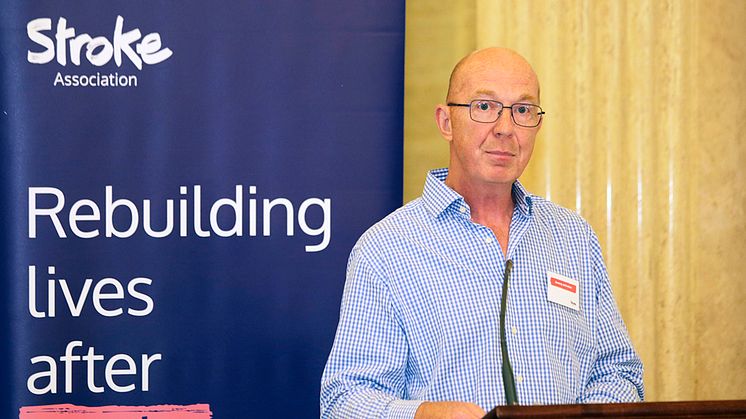
Press release -
Northern Ireland stroke patients “badly let down” by lack of progress on Action Plan
Stroke patients in Northern Ireland are being badly let down by continuing delays in creating centres of excellence for stroke care, says the Stroke Association.
One year on from the launch of the Department of Health’s long-awaited Reshaping Stroke Care Action Plan, there are still no firm plans for the much-needed transformation of stroke services and development of ‘hyperacute stroke units’ or HASUs. This is despite the Action Plan committing to deciding on a future model for stroke care in Northern Ireland by summer 2023.
The Action Plan sets out the way forward for improving stroke services in Northern Ireland across six priority areas including the miracle stroke treatment thrombectomy, developing hyperacute stroke care, and rehabilitation and long-term support. Its aim is to ensure that everyone affected by stroke receives top-class treatment, care and support.
Last June, then Health Minister Robin Swann warned that “we can and must do better for stroke patients and carers” but that full implementation of the plan depended on additional funding over several years.
Unfortunately, the continuing delay with moving to a model of hyperacute stroke care means that opportunities to save lives and improve outcomes for patients and staff are being missed.
Alasdair O’Hara, Associate Director for the Stroke Association in Northern Ireland, said hyperacute stroke units have the potential to transform stroke care.
“There are around 5,000 hospital admissions due to stroke a year and around 1,000 stroke-related deaths,” said Mr O’Hara. “Many of those who survive are left with profound disabilities.
“Historically, stroke services have been provided by local hospitals, but this means they are often spread too thinly to maintain the necessary quality care and staffing levels. We have seen the implications of this with the recent withdrawal of stroke services from Daisy Hill Hospital in Newry due to staffing issues.
“While being treated on any stroke unit is better than not being treated on one at all, we know that larger stroke units work more effectively than smaller ones and, most importantly, deliver better outcomes for patients.
“To survive a stroke, you need the right ambulance to take you to the right hospital for the right treatment as quickly as possible. That means hospitals with stroke units open 24/7 with specialist staff and equipment ready to rapidly diagnose and treat patients.
“Research from elsewhere in the UK shows that reorganising stroke services and ensuring that every patient is cared for on a hyperacute stroke unit can save lives and reduce length of hospital stay.
“In Northumbria, a mostly rural area similar to Northern Ireland, centralising three acute stroke units into one hyperacute stroke unit reduced the total length of hospital stay for patients by nearly five days and shortened the time taken for patients to receive thrombolysis – clot-busting drugs – by 26 minutes. This is hugely important when every minute matters.”
“The Welsh Government are also transforming their stroke services. It’s vital that Northern Ireland doesn’t fall behind in terms of providing a progressive stroke service for patients and the workforce.”
Mr O’Hara’s comments came after the charity hosted a reception at Stormont to mark the anniversary of the launch of the action plan. Stroke survivors, health professionals, volunteers, health charities and decision-makers from the Department of Health gathered to reflect on progress to date and focus on the future.
His words were echoed by stroke survivor Jeremy Johnston, from Hillsborough, County Down, who spoke at the reception.
“Funding is at the centre of this, but surely better early interventions would lead to better outcomes, shorter hospital stays and less requirement for ongoing care in many cases, saving resources and money, said Mr Johnston.
"However, it doesn’t take a political analyst to work out that these things may be more easily achieved with a functioning executive.”
Mr O’Hara praised the Department of Health for progress on some aspects of the Stroke Care Action Plan.
“It’s important to acknowledge that there have been some successes and we should celebrate these,” said Mr O’Hara.
“Northern Ireland is a leader in treating patients with thrombectomy – a game-changing procedure where the clot is literally plucked from someone’s brain, instantly restoring blood flow. We are optimistic that the Department of Health and medical professionals will be able to make this service available 24/7 to everyone who could benefit from it in the not-too-distant future.
“We now need to move forward with the standardisation and improvement of hospital stroke services – patients and the workforce cannot afford to wait any longer.”
Topics
Categories
- Stroke strikes every five minutes in the UK and it changes lives in an instant.
- The Stroke Association is a charity working across the UK to support people to rebuild their lives after stroke. We believe that everyone deserves to live the best life they can after stroke. From local support services and groups, to online information and support, anyone affected by stroke can visit stroke.org.uk or call our dedicated Stroke Helpline on 0303 3033 100 to find out about support available locally.
- Our specialist support, research and campaigning are only possible with the courage and determination of the stroke community and the generosity of our supporters. With more donations and support, we can help rebuild even more lives.
- You can follow us on Twitter, Facebook and Instagram.


